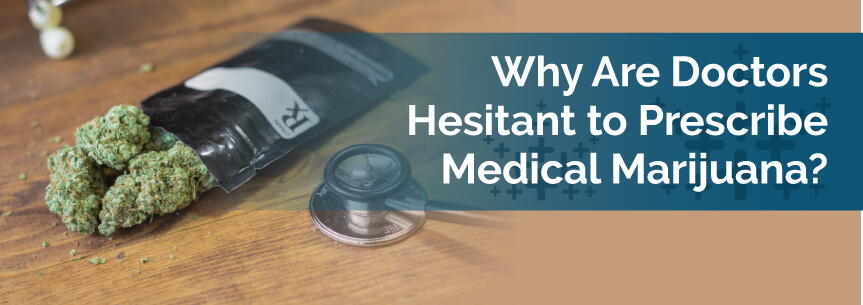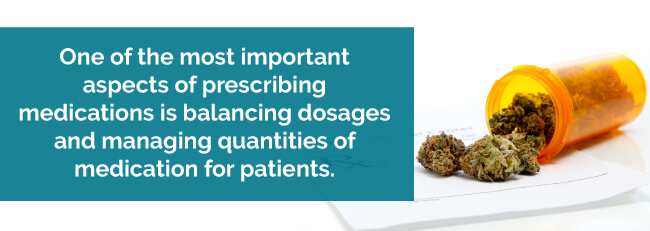
Marijuana has a storied history of medicinal uses. Ancient Chinese, Egyptian and even Roman healers used it both internally and externally for pain relief and long-term disease treatment. Even Queen Victoria used it to ease her pain during labor.
Today, marijuana is approved for use across the United States in nearly half of the states plus the District of Columbia. Advocates promote it as a treatment for cancer, hepatitis, glaucoma, ALS and even HIV. The FDA has even approved basic research on marijuana’s potential as a treatment for childhood epilepsy.
However, many doctors still haven’t embraced marijuana as a legitimate form of medicine. Almost half of Colorado’s physicians believe doctors shouldn’t prescribe marijuana and a minority believes it has no benefits at all.
So why do doctors believe what they do — and why are they so hesitant to embrace marijuana as a medical therapy? Here are a few of the most common reasons doctors treat medical marijuana so cautiously and how you can talk to your doctor to assuage some of their larger concerns.
One of the biggest factors physicians and lawmakers point to is the lack of extensive research on marijuana and its effects. Because it is a Schedule I controlled substance, federally-funded research labs have been unable to study the effects of marijuana and its efficacy as a treatment option for patients.
Especially scarce are the placebo-controlled, double-blind clinical trials most doctors depend on to determine the effectiveness of therapy. Until the results of such clinical trials are published, many doctors will continue to be hesitant to prescribe marijuana for their patients.
Although clinical trials aren’t yet available, there have been thousands of studies on marijuana that are now available online. If your doctor wants proof of marijuana’s efficacy, start there. You might also want to emphasize that marijuana is non-addictive and nonlethal, unlike opioid prescriptions.
Though you might see doctors adopting the latest new surgical technology or medication on TV, in reality doctors are very cautious when it comes to taking on new therapies. While new technology and therapy may seem to be the popular thing, it’s daunting to physicians, as their patients’ lives are often on the line.
In those situations, it’s more comfortable for them to stick with what they know works. With marijuana, many doctors have operated for a long time under the belief that it’s a highly addictive and harmful drug. To change the script on weed completely is too much for many doctors. Additionally, new physicians who may be more open to the idea of marijuana are being trained by more conservative mentors — since they’re new to the field they’re more likely to default to the thoughts and opinions of their teachers.
The stigma against marijuana amongst doctors is a strong one and may be difficult for your doctor to get past. One of the most important things to do if your doctor is hesitant due to their biases is to present them with research about the benefits of marijuana. You should also make it clear to them that you’re seeking marijuana for purely medical reasons — not to get high. They don’t want to feel like they’re simply your dealer.
The culture surrounding marijuana has become just as much a deterrent as the plant itself. Strain names, though arbitrary, can be off-putting and difficult to take seriously when they incorporate the name of a sex move or swear word. Marijuana is also closely associated with other aspects of stoner culture, like alternative medicine, Americanized Eastern belief systems and “hippie” culture.
While this is all a natural result of marijuana prohibition and the history of marijuana usage in the United States, it’s uncomfortable for doctors to handle and makes them less likely to treat it as real medicine.
When talking to your doctor, be sure to avoid aspects of alternative medicine and stoner culture that they might find unpleasant. Focus on the science around marijuana treatments and try to find a local dispensary with reasonably-named strains that have detailed descriptions. This should help your doctor ease into the idea.
One of the most important aspects of prescribing medications is balancing dosages and managing quantities of medication for patients. Doctors like treatments that are quantifiable and repeatable so they can more easily monitor and customize their patient’s treatments. It’s also important because marijuana interacts with some drugs and can even decrease the efficacy of anesthesia, which can pose a problem during surgeries.

If dosing is a major concern for your doctor, some producers have started labeling their products with the amounts of THC, CBD and CBN they contain. Though not all dispensaries have started doing this, MMPR-licensed producers have all been forced to start adopting this labeling procedure.
Prescription narcotic abuse is a deadly problem in the United States today, killing thousands of people each month. With so many people suffering from prescription drug abuse, doctors are getting more training than ever on how to spot drug-seeking behavior and how to prevent over-prescribing addictive drugs. Considering what the narrative on marijuana has been for the past century, it’s no wonder why doctors are treating marijuana with the same wariness they’re trained to treat opioids.
If addiction is a primary concern of your physician, cite the evidence that marijuana is non-addictive and non-lethal, even in extremely high doses.
Doctors who prescribe marijuana have to be exceedingly careful with their prescriptions. If doctors prescribe too many people, they might be accused of fraud and face fines, criminal charges and even revocation of their medical licenses. Especially problematic are scammers — people who seek out medications they don’t need. Many doctors have been burned by this type of person before and are naturally wary of prescribing controlled substances as a result.
If your physician is concerned that you might be a scammer, give them evidence of your need and time to process why you need a prescription. Your doctor needs to be able to trust that you’re not a recreational user looking for a medical prescription, so give them as much time as you can to get over their initial wariness.
Medical marijuana still faces several challenges on the road to national legalization. Keep up-to-date on the latest news in medical marijuana issues by following our news blog.
No Information on MarijuanaDoctors.Com should be used to diagnose, treat, prevent or cure any disease or condition. You can view our Full Disclaimer here.